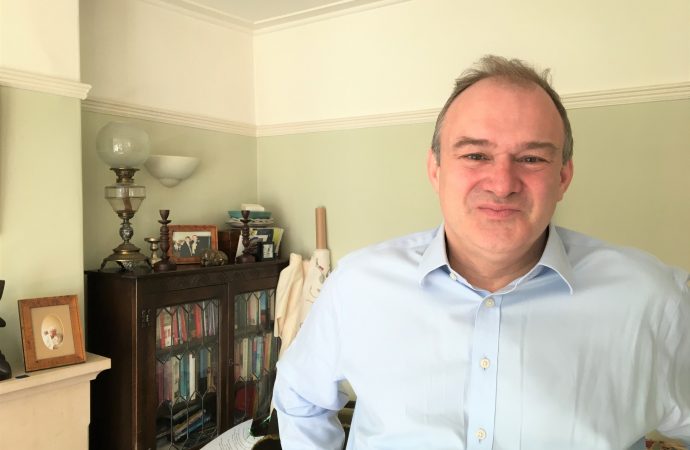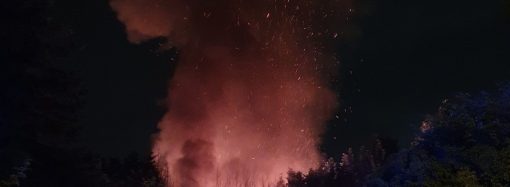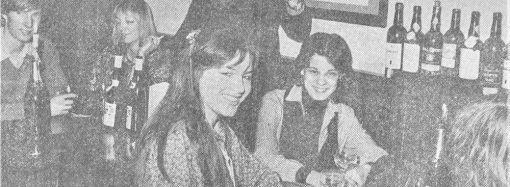EXCLUSIVE: Surbiton MP Ed Davey – a former chair of the government’s emergency committee Cobra – speaks candidly about the coronavirus crisis Kindness and volunteering will help Surbiton survive the current pandemic as the community rallies to support its most vulnerable residents. That’s the upbeat message from Surbiton MP Ed Davey, who describes himself
EXCLUSIVE: Surbiton MP Ed Davey – a former chair of the government’s emergency committee Cobra – speaks candidly about the coronavirus crisis
Kindness and volunteering will help Surbiton survive the current pandemic as the community rallies to support its most vulnerable residents.
That’s the upbeat message from Surbiton MP Ed Davey, who describes himself as “a naïve optimist” in an interview with The Good Life this week.
- As a past chair of the Cobra committee, he gives an insight into how the government is tackling the current emergency;
- Party politics may have taken a back seat, but he has strong views on public trust in the prime minister;
- On climate change and the long view, he says the coronavirus may ultimately alter the way we live and work.
Locally, Sir Ed has been liaising closely with Iona Lidington, Kingston borough’s director of public health, about measures to fight coronavirus.
He also said he would be sitting down and ringing round all Surbiton’s care home owners to ensure they were being fully supported.
“Care homes are really good at infection control anyway, but I’m more worried about domiciliary care; there are some very frail elderly still in the community who rely on meals-on-wheels.”
Ed Davey, who is also co-leader of the Lib Dems, has been heartened by the public response to the crisis. One offer of help locally had come from a group of local police cadets who, on their own initiative, had made contact to ask what they could do.
“I want to play my part in assisting those who are most vulnerable,” he said. “I’m confident we can cope. There are lots of people in the voluntary sector, and people who are community-minded, who want to help.
“What people need is guidance and advice, so they don’t put themselves at risk. I think we all have a duty to help, but those duties are in a hierarchy, and our first duty is to make sure we don’t spread the virus. That’s the top one.
“Secondly, it’s to look after the most vulnerable and needy in society. It’s quite a big group, and we have to work out how the state and voluntary sector can be coordinated in a fast-moving situation.”
With the postponement of local elections, he said that Lib Dem supporters, who would otherwise have been leafleting, were now switching to community support.
Though many people recall that Ed Davey served as Secretary of State for Energy and Climate Change (2012-15) in the coalition, few know that he once chaired the government’s Cobra emergency meetings – giving him an insight into activities behind the scenes in Whitehall.
As we sipped tea in the living room of his Surbiton home, he told how he came to be in the hot seat, chairing ‘war room’ gatherings of panjandrums, mandarins, experts and MPs.
Rewind to 2012, and the fuel tanker dispute.
“The Unite union had managed to create a nationwide strike among the workforces and companies that drove the tankers from the refineries with the petrol and the diesel,” he said. “It was really an attempt by Len McCluskey [Unite general secretary] to undermine the coalition government.
“Initially, Francis Maude [at the time Minister for the Cabinet Office, with responsibility for industrial relations] was in the chair on Cobra.”
Sir Ed said that he, Justine Greening [then Transport Secretary] and other ministers implored Maude not to tell people to stock up on petrol as it would provoke bedlam at filling stations.
“He ignored that advice and [on March 28 2012] told people to go and fill up their jerrycans. We saw a run on the pumps, and the crisis we were trying to avoid, he managed to create all by himself. So he got fired.
“David Cameron threw the hot potato to me and said ‘Secretary of State for Energy, you are now chairing Cobra, you are now in charge of this crisis… over to you!’ So I chaired Cobra during a national crisis!”
His bedtime reading for the next night or two was a hefty document called National Plan (F)… the ‘f’ being ‘fuel’.
Written in the wake of the 2000 fuel strike, it completely missed the mark. “I said to [wife] Emily: ‘If we ever have to implement that, the government falls!’ What they’d written was dealing with a crisis that had happened, as opposed to having a plan to stop the crisis happening.
“So we had to completely rethink. Cameron was really good in that he told the Secretary of State for Defence at the time, Philip Hammond, that however many troops we needed to drive the tankers, the army had to provide them.
“That brought the generals in, who were fantastic. Absolutely fantastic! They know logistics, and they crunched it. Hammond was under pressure, but he was very good; I’ve actually got a lot of time for Philip Hammond. We were training up the troops.
“Essentially it showed me that even if you have a plan, the plan might not be right. And you have to get in the army. My prediction is that the military will be critical [in the current crisis]… and the police force and Territorial Army. And we can trust them to do it the right way.”
In terms of government preparedness for the coronavirus crisis, Sir Ed said that different scenarios were regularly practised.
“This has been game-played,” he said. “As Energy Secretary, I sat on the National Security Council, because energy’s vital to the running of society. What that meant was that you’d have regular meetings and review all security issues and foreign policy issues, and the risks facing the nation’s security.”
In his ministerial role, he took part in a full-scale exercise on an imagined nuclear disaster.
“Every year or six months we reviewed risks such as massive strikes, climate change, military attack… but actually, the No1 risk was pandemics.
“So this is not new, it’s not a surprise, it’s not a shock to the system. Pandemics, and how we would respond to them, has been game-played by the government,” he said, adding that ex-colleague Dr Phillip Lee [who defected to the Lib Dems from the Tories in the last parliament] had led a pandemic exercise when he was a junior minister at the health department.
“That’s not to say they know what’s happening, but they are aware that this is a major risk and it has been thought about before, so they’re not just making it up as they go along. But every virus is different, every situation is different, and so they’re still having to learn.
“It’s why you have so many behavioural scientists; they’re trying to work out how people are going to respond.”
Sir Ed said that it was a time for the country to come together to battle a common enemy, but he still has reservations about the PM’s fitness for fighting the crisis.
“This is no time for party politics,” he declared. “We’ve had many discussions within our [Lib Dem] group; I’ve had people saying you’re being too party political – and I haven’t done anything at all! And I’ve had others saying we’ve got to be more party political and go for the jugular. And I say ‘No, no, no’.
“My worry about [Boris] Johnson is that a lot of people do not trust him. He looks deeply uncomfortable in all this. I never thought I’d hear myself saying this, but ‘Bring back Theresa May!’ But we’ll see how he manages; people like me have to be constructive!”
Ed Davey’s background is in economics (he has a master’s degree in the subject from Birkbeck College, University of London), and he predicts further major policy shifts down the line as the government grapples with the economic fall-out from coronavirus, and its effect on businesses.
“Judging the right economic package [to safeguard beleaguered businesses] is quite tough; in the first place [the government] may have to go overboard, and then row back,” he said, adding that the first phase of response was to shore up confidence.
“If you remember what happened in 2008 [the banking crisis], which is seared on most people’s memory, all the screens were going red and the banks were going down… Gordon Brown, whatever one thinks of him, acted very, very fast in a coordinated way and basically said: ‘The system will not close’.
“Monetary policy by itself will not sort this out. It can be powerful at certain times, but this is about paying people’s wages. This is about the cashflow of small companies. If people aren’t coming in and buying a meal, or buying a pint, or doing their normal shopping, there’s no money, and you get a classic downward spiral where demand completely collapses.”
He is impressed by the quality of advice from those in the know. “I think our job is to be very supportive of the experts, and it is reasonable that the advice of experts can change,” he said.
His legitimate role, as an MP, is to ask questions.
“They should be asked in a tone which is not sort-of ‘You’re rubbish, aren’t you?’ The tone should be ‘Please explain; we need to know and understand this’.”
He did say, however, that the government had seemed “a bit cack-handed” so far. “There was a sense last week that [the government] was playing catch-up with the rest of society, and they were losing confidence.”
Stressing that he was not reinventing himself as ‘an armchair virologist’, he applauded the introduction of daily briefings, and urged the Conservatives to involve opposition parties more than they have done.
“Johnson isn’t trusted; I don’t trust him, and there are millions and millions and millions of people who do not trust him. So he needs us because we’d normally be the ones saying ‘We don’t trust this man’, so he needs to realise that we are a valuable commodity, bringing the country together and hopefully giving people confidence which they’re going to need in this extraordinary moment.
“These are deeply alarming days. It’s horrendous. I’m thinking about my family and thinking about my constituents. This could get so out of hand. You see the scenes in Italy.”
Does the former Energy Secretary believe that one potential longer-term effect of Covid-19 could act as a wake-up call to everyone on the seriousness of climate change.
“In the short term, there can be no doubt that reduced flights in particular are going to reduce the pollution that is causing climate change. But the idea that the solution to climate change is a permanent lockdown isn’t right. People need to live, they need food, they need to work, economic activity needs to happen.
“But it might be a wake-up call on how serious an issue climate change is, and it might enable people to reflect that there are different ways of doing things. The most obvious one is home-working, with use of the various technologies we have meaning a reduction in the need to travel.
“The worry for the fuel and transport industries isn’t just that short-term demand, but also long-term demand could be hit.
“These are early days, but it could change behaviour. If you think of the big things that change societies, the big analogies are wars, unfortunately, where the whole of society is put on a different footing, people mix together in different ways and people’s outlook and underlying values change.
“You could say that the Second World War begat the National Health Service. There were moves to more social healthcare before the war, and [William, later Lord] Beveridge, a Liberal, was talking about the health service and the welfare state during the war, but it needed the Labour government in 1945, with a particular set of political values, and the collective beliefs that the war had developed, to make the NHS the success that it has been, and to stand up to the vested interests that didn’t want the NHS.”
The MP said that he was currently reading Climate Change and the Nation State by Anatol Lieven. It opens with the words: ‘When it comes to assessing the risks of climate change, we really ought to look in a mirror, because the risk is us.’
“Lieven argues – and I haven’t fully read it yet – that climate change, which we’re all talking about as a global phenomenon, is something you’re only going to change through national governments saying ‘Yes, we have to do this’.
“I very much hope we can take lessons from this. You can lock down, have social distancing and cancel events, and hopefully that will supress the spread, but the question now is: ‘What’s the exit strategy?’ We’re all sort-of groping in the dark these days.
“I’m a naïve optimist. I think people will respond; human nature is basically positive. Although there’ll be some people who will exploit this, and we’ll have to be on our guard a little bit.”
For updated local information and advice, and information on volunteering, helping others and assisting vulnerable neighbours, visit www.kingston.gov.uk/coronavirus










Leave a Comment
Your email address will not be published. Required fields are marked with *